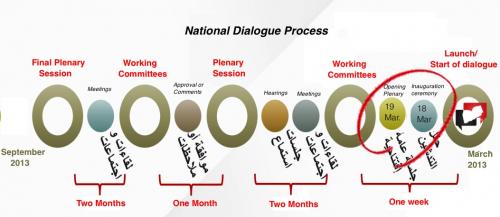Yemen’s National Dialogue Conference (NDC), which began on March 18 and just reached the halfway point of its six-month mandate, was conceived as a core part of the transition process and is intended to bring together Yemen’s diverse political, social, geographic, and demographic groups to address the most critical issues plaguing the beleaguered country. Unfortunately, the way the dialogue was developed, designed, and directed created intrinsic flaws that may undercut its success. Some argue that the large number of participants and the lack of genuine representation outside of political parties are the reasons it is doomed for failure. Others feel that the process is advancing too quickly, leaving honest reconciliation out of the equation. One of the other major concerns is the lack of clear communication with the Yemeni public, transparency of the proceedings, and oversight of expenditures.
Although some Yemen experts remain pessimistic about the future of the country, they refrain from critiquing the dialogue because the outcome is still unclear and many perceive the dialogue as the only way to prevent a descent into civil war. Particularly because the process is opaque and because there is genuine skepticism about the Gulf Cooperation Council (GCC) transition agreement and the dialogue itself, the NDC should pro-actively report on all working group and plenary proceedings, publish all records and modifications, and disclose all financial contributions and allocations. This is the time to measure the discrepancy between the dialogue’s stated intention and the reality on the ground, if there is hope for effective progress.
The Technical Committee of the National Dialogue clearly stated in a December 2012 statement that the NDC will have its own radio and television channel; however, this promise was never fulfilled. Instead, the NDC opted for the use of modern social media sites like Twitter, Facebook and YouTube, catering exclusively to the international community and the less than 15 percent of Yemenis who use the internet. Since March 18, not a single Facebook NDC post received more than nine comments.
Although the Dialogue’s Secretariat has tried to provide some information on its website, there is a tendency to understate or leave out important details that relinquishes crucial information to the interpretations of partisan media outlets. While some facets of the dialogue are downplayed, others are entirely omitted. For instance, the final reports of the nine working committees remain unofficial; some reports have surfaced, but only because they have been leaked. Also, there is no updated official list of participants available on the website or elsewhere since approximately thirty members of the NDC withdrew and/or were replaced. Likewise, there is no official record of all organizations and agencies “supporting” the NDC, like the United Nations (UN), World Bank, and United States Agency for International Development (USAID).
The lack of disclosure raises many important questions regarding the nature and amount of support that international organizations are providing. For example, the high-end Movenpick Hotel is the official NDC venue and it is reportedly packed with foreign governance experts and consultants who are being handsomely compensated, but little is known regarding the affiliation of these experts, what technical assistance they are offering Yemenis, or whether their role is beneficial and effective. With no answers in plain sight, it is easy to accuse the NDC of the selective concealment of facts.

This shortage of information and lack of community is still at times blamed on budget constraints even though the NDC’s official website reports that a total of 138 computers, thirty-five laptops and 225 cell phones were purchased. The initial budget for the NDC was an estimated $35 million dollars and according to more recent reports, $29 million has already been utilized. It is public knowledge that members of the NDC residing in Sana’a are compensated $100 per day and those residing outside of Sana’a are compensated a $180 per day. Millions are being spent on honoraria for members of the dialogue, compensation for foreign expertise, and the administrative expenses of the day-to-day operations; yet there is no easily accessible source of information regarding these expenses and the overall budget for the dialogue. This transparency is important not only for the NDC, but also because such practices would set a positive precedent as a possible blueprint for how the next Yemeni government will budget, spend, and monitor its public funds. Without budget transparency, the average Yemeni has little reason to trust the dialogue, the transitional process, or any future government.
Just like the dialogue, transparency is a process, and in the NDC’s case, it is one that needs constant cultivation. The main facilitator of the GCC initiative and UN’s special envoy to Yemen, Jamal Ben Omar, asserts that the NDC is the most successful transitional process in the Arab World and the only transparent process that will provide real outcomes. Yet, in several interviews, he had to dismiss rumors claiming that the outcome has been predetermined or that the solutions will be determined by the old ruling elites outside the NDC process. These assertions gain steam among the public because of the obscurity surrounding the NDC; the only way to ensure a successful transitional process is to engage the Yemeni people – openly, actively, and with a genuine spirit of inclusivity. Transparency does not guarantee the success of the dialogue, but it is a fundamental requirement to gain the trust of the Yemeni people.
Sama’a Al-Hamdani writes the blog Yemeniaty, which covers a range of topics on Yemen, focusing specifically on women’s issues. She has published articles in The National, Yemen Observer, Yemen Times, News Yemen, and Fikra Forum.

